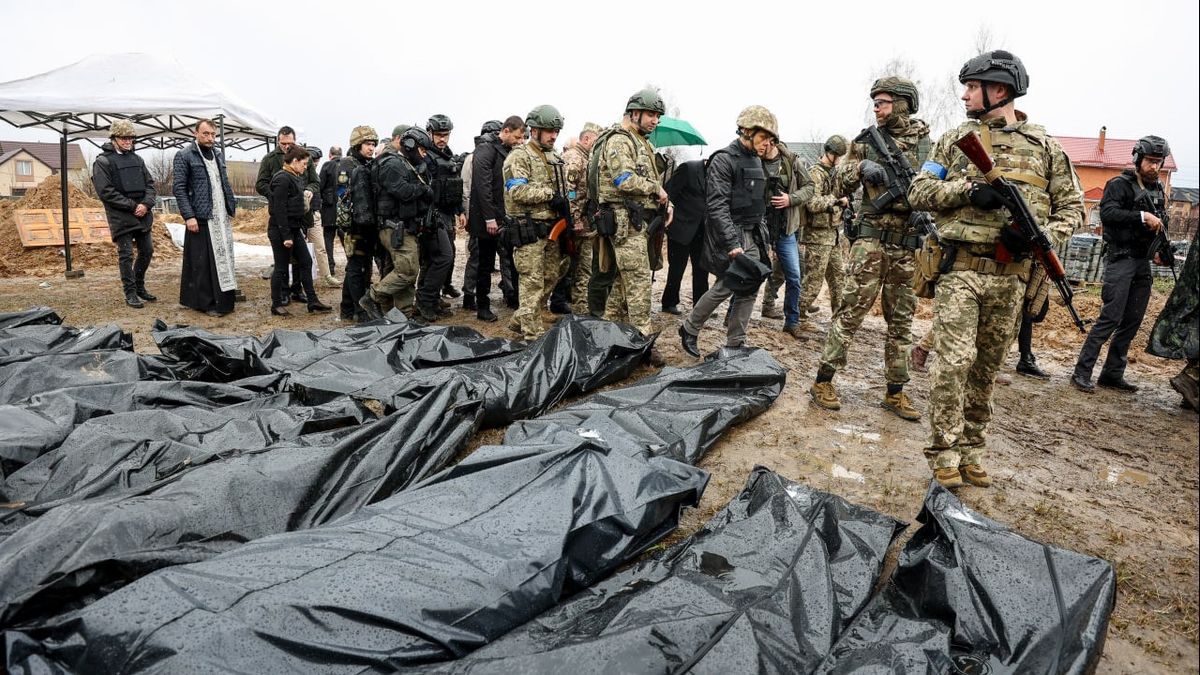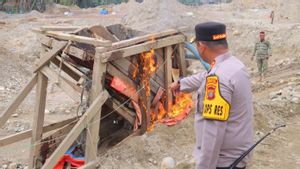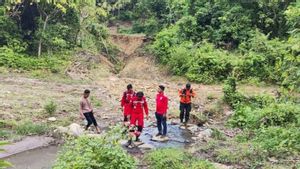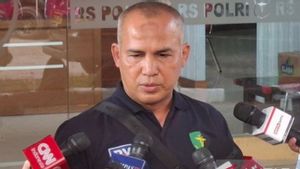JAKARTA - The government is preparing charges against at least seven Russian soldiers for war crimes, including three pilots suspected of bombing civilian buildings in the Kharkiv and Sumy regions, according to the Ukrainian Prosecutor's Office.
The other four are two rocket launcher operators who allegedly opened fire on residential areas in the Kharkiv region, as well as two soldiers who are suspected of killing a Kyiv resident and raping his wife.
The prosecutor's office said it had notified the people they were suspects and an investigation was ongoing, adding no charges had been brought before the court.
Authorities did not name the suspect or provide evidence to support the allegations. It said several suspects were being held as captives, without specifying where, while other charges were being prepared in absentia.
Ukraine says it is investigating about 7,600 potential war crimes and at least 500 suspects, following Russia's invasion of its neighbor on February 24.
Attorney General Iryna Venediktova told Reuters many of the suspects were in Russia but some had been held by Ukraine as prisoners of war.

Speaking in an interview earlier this month, he said his office intends to follow the chain of command of Russia's political and military hierarchy.
Venediktova added that she plans to prosecute both in Ukrainian courts and at the International Criminal Court (ICC) in The Hague, the world's permanent war crimes tribunal.
Meanwhile, the Kremlin and Russia's Ministry of Defense did not respond to requests for comment. Moscow has rejected accusations by Ukraine and Western powers of war crimes, denying targeting civilians in what the Kremlin calls a special military operation to demilitarize its neighbour.
Instead, Moscow has accused Kyiv of genocide against Russian-speaking speakers, which Kyiv vehemently denies. Russia has also opened a criminal case over the alleged torture of Ukrainian soldiers against their Russian counterparts.
The Ukraine investigation is at the center of efforts to investigate potential war crimes linked to the conflict, including by the ICC. The investigation is at a very early stage, people familiar with it said. The ICC has sent an advance team to the region to carry out the operation.

Ukraine, which is conducting its investigations while still in the throes of war, is scrambling to assemble a team of specialists with war crimes expertise, evaluate potential crimes and develop prosecution strategies.
"You can see they are now excavating bodies, so (the investigation is at) a very early stage," said a person familiar with the process.
In terms of strategy, Kyiv plans to prosecute as many as possible in Ukrainian courts but is likely to submit any case involving higher-ranking figures to the ICC, the person added.
The United Nations has also established its own investigation into possible violations of international humanitarian law in Ukraine, including possible war crimes, which could be subject to prosecution by the ICC.
There are also coordinated efforts by the European Union to expedite the sharing of evidence between the various investigative authorities, including with the ICC. Several European countries have said they will exercise universal jurisdiction, the legal principle that some crimes are so egregious that they can be tried by foreign national courts, and their prosecutors can launch investigations into Ukrainian atrocities.

For Ukraine, the immediate challenge is the sheer volume of potential evidence and witness testimony that needs to be secured and recorded in a way that can be used in court, legal experts say. That includes a large amount of digital imagery as well as material collected in the field.
David Schwendiman, a former US federal prosecutor who also helped prosecute war crimes committed during the Balkan wars in the 1990s, praised Ukraine's attorney general as talented and courageous.
Still, he said the country had no experience in investigations of this scale and would need outside help to process potential crime scenes, in a manner that met international standards.
"Every body is a crime scene. Every building is a crime scene. Every city is a crime scene," said Schwendiman.
"Something as small as a piece of cloth torn from a uniform, a bullet casing or even a strap used to bind someone's hands can help identify the particular unit involved and therefore need to be carefully preserved," he said.

Zera Kozlyieva, deputy head of the war crimes unit at the prosecutor's office, acknowledged limited access due to ongoing hostilities and a shortage of war crimes specialists presented challenges.
Speaking Thursday at a panel at the international affairs think tank Chatham House, he said Kyiv was seeking help from international experts.
Separately, Beth Van Schaack, Ambassador for Global Criminal Justice at the U.S. State Department, said Ukraine's biggest potential challenge, Van Schaack said, was securing the custody of suspects, especially those at the top of the chain of command. "If they had remained in Russia, they might "enjoy impunity for the rest of their days," he said.
According to the United Nations, as of April 22 more than 2,400 civilians have been killed since the conflict began in late February. But the official count is likely to rise. In the port city of Mariupol alone, local authorities say thousands have died.
Under international law, war crimes include deliberately targeting a civilian population, intentionally killing or causing suffering, and widespread destruction among other serious violations of the laws applicable in armed conflict. Individuals who commit such crimes can be prosecuted by international courts such as the ICC and by states.
The English, Chinese, Japanese, Arabic, and French versions are automatically generated by the AI. So there may still be inaccuracies in translating, please always see Indonesian as our main language. (system supported by DigitalSiber.id)













